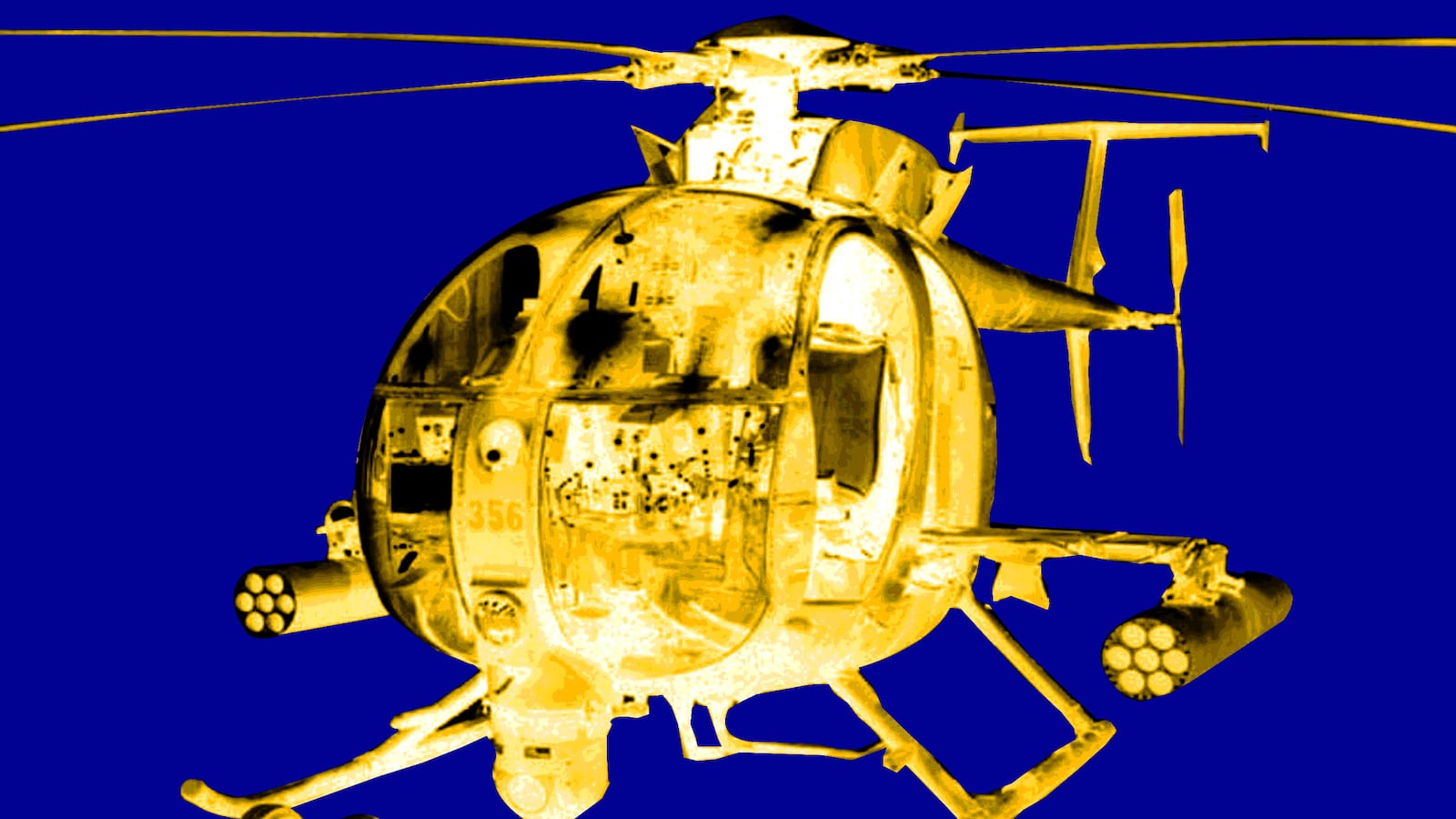A mercenary air force that became a symbol of the U.S. occupation of Iraq is back in action—this time in Central Africa, supporting a shadowy American U.S. Special Forces commando operation targeting the Lord’s Resistance Army.
In late January, a source on the ground in Central African Republic spotted a Sikorsky S-61 helicopter with the registry number N408RC carrying American Special Forces troops. The LRA, a cultish band of thieves and rapists led by warlord Joseph Kony, is most active in the forested region where Central African Republic, South Sudan, and the Democratic Republic of Congo meet.
In 2010, President Barack Obama deployed around 100 Green Berets and other personnel to Central Africa to help local forces hunt down Kony and the LRA. Seven years later, Operation Observant Compass continues, mostly unnoticed by the press. The Pentagon asked Congress for $23 million to extend the operation through 2017.
According to the Federal Aviation Administration, the Sikorsky helicopter that The Daily Beast’s source observed in Central African Republic belongs to Illinois-based EP Aviation, LLC.
EP Aviation was once a subsidiary of Academi, the Virginia-based company that was formerly known as Blackwater. The “EP” stands for “Erik Prince,” Blackwater’s founder and the younger brother of billionaire U.S. Secretary of Education Betsy DeVos.
The copter’s appearance is a reminder of the tangled web of corporate relationships that support the Pentagon’s expansive shadow wars in the Middle East, Central Asia, and Africa—and some of the companies’ ties to wealthy, powerful American politicians.
During the height of the Iraq War, Blackwater managed a for-profit army in Baghdad that included Little Bird helicopters and other aircraft. The U.S. State Department and Defense Department have awarded Blackwater and its successors contracts worth hundreds of millions of dollars.
In Iraq, Blackwater's diminutive Little Birds usually carried a crew of four—two pilots and two door gunners armed with assault rifles. With their very corporate-looking blue-and-silver paint schemes, the Blackwater copters became icons of a grinding, unpopular war.
The Little Birds were also symbols of Blackwater's heavy-handed tactics. The company and its employees in Iraq were involved in several suspicious killings -- and worse. In September 2007, Blackwater guards killed 17 Iraqi civilians at Baghdad's Nisour Square. Four of the mercenaries went to prison for the killings.
Blackwater's aviation operations were also controversial. One Little Bird was shot down in Baghdad and its five-man crew was killed. Another Little Bird crashed in Iraq and the two pilots died. The company lost several other aircraft in fatal accidents in Iraq.
In 2004, a Blackwater transport plane crashed in a mountain canyon in Afghanistan, killing the three crew and three U.S. troops who were passengers. The National Transportation Safety Board found that the pilots deliberately flew a risky flight path through the mountains. "I swear to God, they wouldn't pay me if they knew how much fun this was," the cockpit voice recorder captured one pilot saying shortly before the crash.
Dogged by lawsuits, Prince sold Blackwater in 2010 and moved to the United Arab Emirates. He subsequently founded Frontier Resource Group, a company that reportedly provides pilots for the Emirates’ brutal air war in Libya. Prince’s new company also tried to skirt U.S. regulations in order to sell attack planes to Salva Kiir, one of two warring strongmen in South Sudan.
Prince has reportedly advised President Donald Trump, who appointed DeVos as education secretary despite stiff opposition from Democrats and even some Republicans. DeVos contributed millions of dollars to the campaigns of senators who voted to approve her appointment.
Following Prince’s departure, Blackwater changed its name several times and came under new ownership. In 2010 it sold EP Aviation and other aviation assets to Illinois-based AAR, also known as Airlift Group, a self-described provider of “world-class expeditionary and conventional aviation solutions.” Around 60 ex-Blackwater aircraft continue to be registered in EP Aviation’s name.
AAR did not respond to The Daily Beast's request for comment.
U.S. Special Operations Forces in Africa rely heavily on innocent-looking, civilian-style aircraft. Some are actually military aircraft that wear civilian paint schemes. Others are civilian aircraft operating under contract with the Pentagon. On Feb. 6, the Defense Department awarded AAR/Airlift Group a $204-million contract to support U.S. forces in Africa through January 2018.
According to the military's official "Central Africa Task Order," dated November 2016, American troops in the region need at least two fixed-wing planes in Entebbe, Uganda; another two fixed-wing planes in Nzara, South Sudan; plus five helicopters in Obo, Central African Republic. U.S. Special Operations Command was not able to fulfill an interview request before this story's deadline.
The civilian planes and copters transporting American commandos in their hunt for Kony and the LRA can expect to come under fire, according to the military's official work statement, dated October 2016. "In the event a contractor operating a mission is illuminated or 'spotlighted,' or is fired upon in the air or on the ground, the crew shall note the date, time and approximate area from which the event originated," the statement noted.
But unlike Blackwater's Little Birds in Iraq, the mercenary copters in Central Africa aren't armed—and cannot shoot back.






